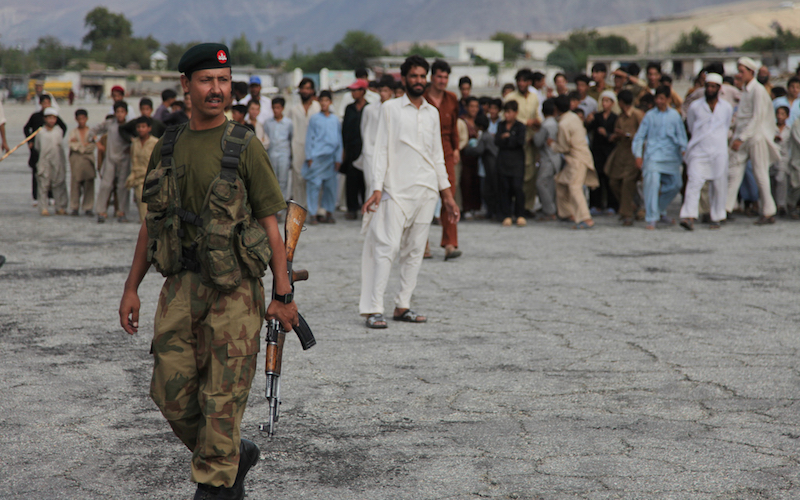
The Wagah Bombing and the Sorcerer’s Apprentice in Pakistan
The last few months have cast new light on what can be called the “Sorcerer’s Apprentice” problem in Pakistan. Goethe’s classic tale about the dangers of conjuring up proxies one cannot ultimately control is an apt analogy for the predicament Pakistan finds itself in whereby some of the Sunni-based jihadi forces it has long directed to do mayhem against others have now turned against it.
Besides causing increasing levels of chaos inside Pakistan, the “Sorcerer’s Apprentice” problem raises significant questions for Indian deterrence policy vis-à-vis its vexatious neighbor. As then-U.S. Defense Secretary Robert Gates warned a while back, an ominous possibility exists that freebooting jihadi groups will mount operations aimed at catalyzing inadvertent war between New Delhi and Islamabad as a way to advance their own interests. A timely illustration occurred in early September when jihadi forces assaulted a naval dockyard in Karachi, apparently with the aim of seizing a Pakistani frigate that would then be used to attack Indian warships with anti-ship missiles.
Although some details remain unclear, the suicide bombing earlier this month at Wagah, the main road border crossing with India, could well be another example.
The deadliest terrorist strike in Pakistan in over a year, it killed nearly 60 people, including three Pakistani paramilitary troops, and injured well over 100. It occurred just inside Pakistani territory as the famous border-closing ceremony involving Indian and Pakistani guards was concluding at the end of the day.
A variety of jihadi outfits have claimed responsibility. One of these, the Jundallah, a Pakistani Taliban offshoot, states that the bombing was in retaliation for the major military assault the Pakistani army launched this past summer to clear out anti-government militants from the North Waziristan tribal area, a notoriously lawless zone along the border with Afghanistan that has become infested with all sorts of jihadi groups. The operation commenced shortly after the terrorist attack on Karachi’s international airport in early June, and a senior commander of U.S. and NATO troops in Afghanistan acknowledged earlier this month that it has weakened the Haqqani network, one of the main Pakistan-based jihadi groups fighting in that country.
But Wagah remains a curious choice if the real objective was payback for the North Waziristan operation. Even with a heightened police profile due to the Shia holy day of Ashura, the public spaces in near-by Lahore, Pakistan’s second largest city, would have offered a much more inviting target. The security presence at Wagah, which had been beefed up due to an intelligence report about a possible attack, should have served as a deterrent. Indeed, the suicide bomber detonated his explosive vest at a security checkpoint half a kilometer away from the border.
This detail points to the possibility that the attack’s true objective was the infliction of mass casualties on the Indian side of the border. If such an event had occurred, already strained ties between New Delhi and Islamabad could have been pushed to the breaking point. As the eminent Pakistani journalist, Ahmed Rashid, notes: “Militant groups such as the [Pakistani] Taliban – which wants to topple the government in Islamabad – would like nothing better than a conflict between India and Pakistan to distract the army from north Waziristan. The easiest way to achieve this would be by planting bombs on the border, leading both governments to levy accusations of terrorism against each other.”
Indian security officials have reportedly reached a similar conclusion. The Economic Times quotes one as saying that “It appears the target of the bomber was India with collateral damages across the border, but he exploded due to some miscalculation.”
Further underscoring this possibility are the statements issued by Jamaat-ul-Ahrar, a newly-formed Pakistani Taliban splinter group also claiming to behind the bombing. Its spokesman tweeted that “This attack was a message to the governments on both sides of the border. If we can carry out an attack on this side, then we can attack the other side too.” He also warned that the group had set its sights on India and would avenge the deaths of Muslims in the disputed Kashmir region and in Gujarat, the home state of new Indian Prime Minister Narendra Modi. Following this threat, the Indian security services issued an unusual alert about a strike by Pakistan-based terrorists in the port city of Kolkata (Calcutta), causing the Indian navy in turn to hurriedly send two of its visiting warships to sea.
Reuters quotes an Indian security official as acknowledging that “It has been clear for some time that there is no [jihadi] group that is fully within [Pakistan’s] control. They are all itching for independent action, some want to have a go at us immediately.” Yet it is unclear whether Mr. Modi’s government understands this as well. The “zero-tolerance policy” it has adopted toward Islamabad suggests not. But the failure to differentiate between jihadi forces over which Pakistan has some control and those that operate entirely in defiance of the Pakistani state could well lead to military conflict neither country intends.

